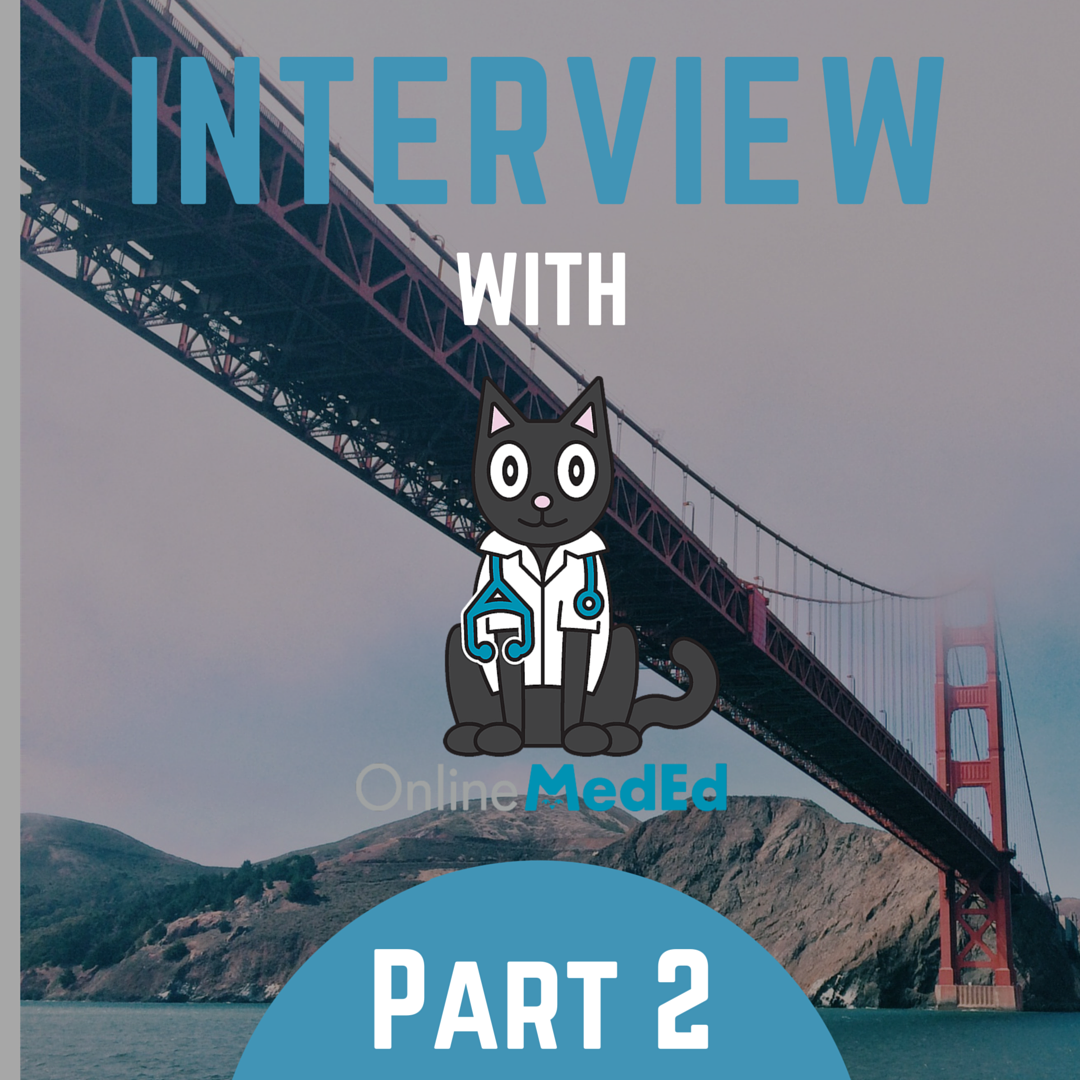OnlineMedEd adds OMM Videos
OnlineMedEd.com launched a new series of videos by Jeremy Polman, covering osteopathic manual manipulation. We now have free videos covering ALL the basic OMM topics you need for COMLEX! So, how good are they? Pretty darn good.
DOs across the internet – are you ready to start cheering?

New videos for DO students makes OME even more awesome.
TL;DR
There are 21 videos, running a total of 6.1hrs (~17 mins per video), for free. If you pay for full access you also get 103 questions in the qBank and 286 Flashback flashcards, ability to download audio of the videos and PDFs with notes and diagrams.
PROs
- Videos are to-the-point, using the same vocabulary we all learned in those early morning OMM classes.
- Covers all the high yield OMM topics you will see on COMLEX.
- With paid access: You can easily download all notes and audio at the bottom of the OMM page (monthly data limits may apply). If you’re an auditory learner and listening to the explanation of OMM helps you learn this could be clutch. But for those who are more kinesthetic, taking notes with occasional video pauses is helpful.
- The questions for the initial videos are straightforward, but so are OMM basics. So I dived into sacral (you’re welcome, team).
- Jeremy’s methods for teaching sacral provide a flowchart for memorizers, as well as an in-depth discussion of sacral movement for those who prefer the drawing method. I’ll admit, memorization makes me tired, so I skipped ahead and found myself remembering sacral mechanics long forgotten. His explanations and drawings make sense in the moment. I didn’t view every single video, but having seen both the first few introductory and both sacral videos I feel confident saying you will definitely benefit from these.
- And, of course, the tagline is so us. “It’s not about what you say, it’s about what you DO.”
CONs
- Jeremy’s videos don’t correlate with Savarese’s order (AKA the magical Green Book of OMM)
- However, matching up video content to Savarese content is active learning and makes you think, so it’s almost a benefit…
- It doesn’t look like OMM has been incorporated into the pre-made study guides.
- So pick 1-3 weeks in your schedule to add that in for Level 2. And Level 3.
- There is a download limit on the monthly subscription, although the annual subscription does not have one. Currently the monthly fee is $70 ($840 per year).
- For residents studying for Level 3 the one-month fee is reasonable, and despite the 30 download limit you can get all the OMM (as there’s only 21 videos and thus 21 PDF downloads).
- And of course you have full access to the qBank and Flashback app for that month.
- For students, it may be better to get the year long subscription, but you can easily keep going the free route, too.
Can the videos be paired with Savarese?
As noted above in CONS, no but you can pair it yourself.
In the future, there may be plans to add OMT textbook chapter references to his videos, and Savarese may make the cut.
Are there diagrams?
Yes, in both the videos and in the PDFs, which is standard for OnlineMedEd.
Even in the basics video you get a logical visual explanation of introductory concepts like thoracic rotational mechanics. Some of the diagrams are fairly basic (ie: sacral/cranial). However, I admit I was spoiled by having gone to school with a former medical-engineer who gave our study group amazing sketches.
The basic diagrams still get the point across, which is – forgive the punning – the point.
Should Residents Use It for COMLEX 3?
If you live in a state that made you wait for med school matriculation (or intern year completion) prior to taking COMLEX Level 3, YES! Why slog through Savarese alone, when you can get the visual-kinesthetic joy of learning with bite sized videos instead?
However, you’ll still need a standard qBank (COMQUEST or COMBANK) due to the unique nature of NBOME style questions.
Is there paid access for OMM only?
Nope. The videos are, as always, free. Full access requires full subscription to get access to notes in PDF format, downloadable audio of the videos, practice questions, access to questions on the FlashBack app.
Even at the current $70/month, you’re paying an average of $3 per video to get a month of access to the extras. If you’re studying for COMLEX Level 2, then this is just extra bonus on top of all the other videos.
For residents it may be worthwhile to pay for access to use FlashBack and the questions, but you should be using a real qBank as well.
What else comes in the Paid version?
Full access to the Dashboard, including:
- FLASHBACK: Found in your Overview (or on the mobile app), OME’s Flashback gives you questions 48 hours after you’ve watched the videos. Based on the idea of “Reinforce to remember,” and in studies with adult learners has been shown to improve long term retention of knowledge.
- PERFORMANCE: This tab shows you where you are on all the OME videos. And that after 2 videos I am now 9.5% complete in the OMM section. Neat.
- MODULES: Found under the Performance tab, these work like any qBank, where you can specify what topics you want to be tested on. So you can go to town with OMM-only questions, and you’ll get 103 of them. Or, mix them in with all the topics on OnlineMedEd and do qBank style self-test.
- REMEDIATION HISTORY: Also under Performance, but I have no remediation history yet. I presume this is where wrong Flashback answers go for repetition in remediation, but cannot confirm.
- FLASHCARDS: Can be viewed on the site at any time.
- Can be set to be filtered to show cards for recently viewed videos, and sorted by topic.
- Can also be sorted to newest or oldest first, giving you pre-built repetition the way YOU want it. Do I seem excited? Well, I was given a 2-day test drive to write my review, but I’m considering paying for this for a month prior to my COMLEX 3 just to enjoy this feature. It’s like an ANKI deck, but I don’t have to build it.
- If you turn on the “Going for Gold” option in the app you can re-visit cards you miss.
Who is Jeremy Polman?
He’s an LMU-DCOM student who added a year to his education to be an OMM fellow, where he contributed to the curriculum and created the first version of the OMM videos for his fellow students. He’s now a Contributing Educator with OnlineMedEd.com, creating excellent videos for DOs. You can read his actual bio online here: https://onlinemeded.org/our-story
How are you studying for COMLEX?
Let us know in the comments.




